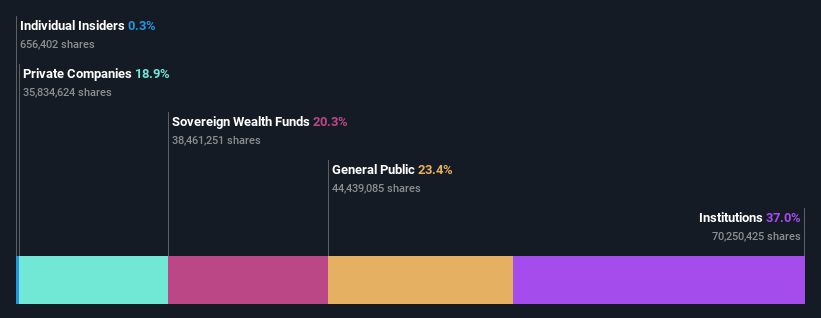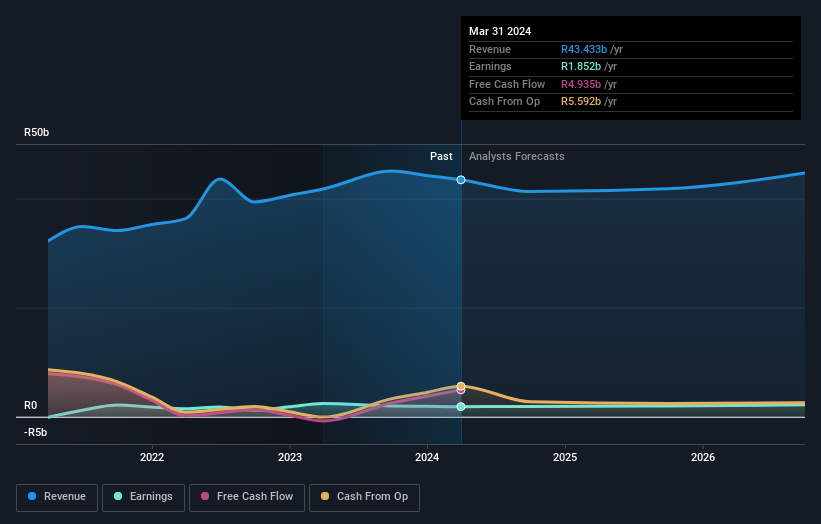- South Africa
- /
- Trade Distributors
- /
- JSE:BAW
Barloworld Limited's (JSE:BAW) large institutional owners must be happy as stock continues to impress, up 6.5% over the past week

Key Insights
- Institutions' substantial holdings in Barloworld implies that they have significant influence over the company's share price
- The top 3 shareholders own 57% of the company
- Ownership research along with analyst forecasts data help provide a good understanding of opportunities in a stock
Every investor in Barloworld Limited (JSE:BAW) should be aware of the most powerful shareholder groups. The group holding the most number of shares in the company, around 37% to be precise, is institutions. In other words, the group stands to gain the most (or lose the most) from their investment into the company.
And as as result, institutional investors reaped the most rewards after the company's stock price gained 6.5% last week. One-year return to shareholders is currently 19% and last week’s gain was the icing on the cake.
Let's take a closer look to see what the different types of shareholders can tell us about Barloworld.
See our latest analysis for Barloworld

What Does The Institutional Ownership Tell Us About Barloworld?
Institutions typically measure themselves against a benchmark when reporting to their own investors, so they often become more enthusiastic about a stock once it's included in a major index. We would expect most companies to have some institutions on the register, especially if they are growing.
As you can see, institutional investors have a fair amount of stake in Barloworld. This implies the analysts working for those institutions have looked at the stock and they like it. But just like anyone else, they could be wrong. When multiple institutions own a stock, there's always a risk that they are in a 'crowded trade'. When such a trade goes wrong, multiple parties may compete to sell stock fast. This risk is higher in a company without a history of growth. You can see Barloworld's historic earnings and revenue below, but keep in mind there's always more to the story.

Barloworld is not owned by hedge funds. Public Investment Corporation Limited is currently the company's largest shareholder with 20% of shares outstanding. Zahid Group Holding, LLC is the second largest shareholder owning 19% of common stock, and Silchester International Investors LLP holds about 18% of the company stock.
After doing some more digging, we found that the top 3 shareholders collectively control more than half of the company's shares, implying that they have considerable power to influence the company's decisions.
While it makes sense to study institutional ownership data for a company, it also makes sense to study analyst sentiments to know which way the wind is blowing. There are a reasonable number of analysts covering the stock, so it might be useful to find out their aggregate view on the future.
Insider Ownership Of Barloworld
While the precise definition of an insider can be subjective, almost everyone considers board members to be insiders. Company management run the business, but the CEO will answer to the board, even if he or she is a member of it.
I generally consider insider ownership to be a good thing. However, on some occasions it makes it more difficult for other shareholders to hold the board accountable for decisions.
Our data suggests that insiders own under 1% of Barloworld Limited in their own names. But they may have an indirect interest through a corporate structure that we haven't picked up on. It has a market capitalization of just R17b, and the board has only R58m worth of shares in their own names. Many tend to prefer to see a board with bigger shareholdings. A good next step might be to take a look at this free summary of insider buying and selling.
General Public Ownership
The general public, who are usually individual investors, hold a 23% stake in Barloworld. While this group can't necessarily call the shots, it can certainly have a real influence on how the company is run.
Private Company Ownership
We can see that Private Companies own 19%, of the shares on issue. It's hard to draw any conclusions from this fact alone, so its worth looking into who owns those private companies. Sometimes insiders or other related parties have an interest in shares in a public company through a separate private company.
Next Steps:
I find it very interesting to look at who exactly owns a company. But to truly gain insight, we need to consider other information, too. Case in point: We've spotted 1 warning sign for Barloworld you should be aware of.
If you are like me, you may want to think about whether this company will grow or shrink. Luckily, you can check this free report showing analyst forecasts for its future.
NB: Figures in this article are calculated using data from the last twelve months, which refer to the 12-month period ending on the last date of the month the financial statement is dated. This may not be consistent with full year annual report figures.
Valuation is complex, but we're here to simplify it.
Discover if Barloworld might be undervalued or overvalued with our detailed analysis, featuring fair value estimates, potential risks, dividends, insider trades, and its financial condition.
Access Free AnalysisHave feedback on this article? Concerned about the content? Get in touch with us directly. Alternatively, email editorial-team (at) simplywallst.com.
This article by Simply Wall St is general in nature. We provide commentary based on historical data and analyst forecasts only using an unbiased methodology and our articles are not intended to be financial advice. It does not constitute a recommendation to buy or sell any stock, and does not take account of your objectives, or your financial situation. We aim to bring you long-term focused analysis driven by fundamental data. Note that our analysis may not factor in the latest price-sensitive company announcements or qualitative material. Simply Wall St has no position in any stocks mentioned.
About JSE:BAW
Barloworld
Operates as an industrial processing, distribution, and services company in Southern Africa, the United Kingdom, Australia, Russia, and Mongolia.
Adequate balance sheet with acceptable track record.
Similar Companies
Market Insights
Community Narratives




